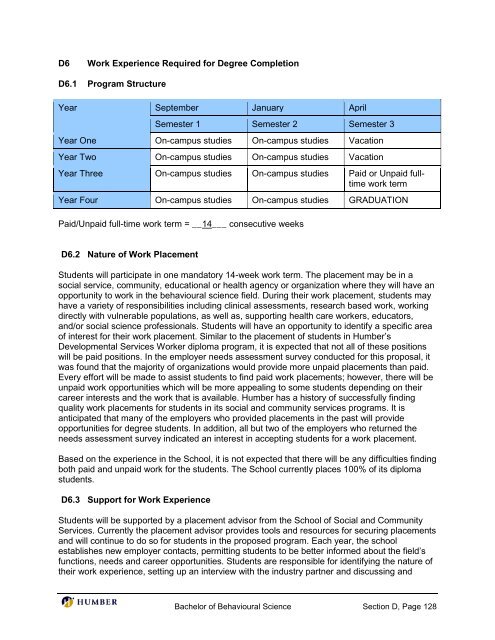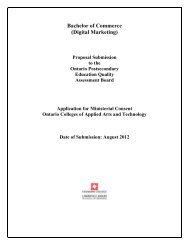Bachelor of Behavioural Science - Postsecondary Education Quality ...
Bachelor of Behavioural Science - Postsecondary Education Quality ...
Bachelor of Behavioural Science - Postsecondary Education Quality ...
Create successful ePaper yourself
Turn your PDF publications into a flip-book with our unique Google optimized e-Paper software.
D6<br />
Work Experience Required for Degree Completion<br />
D6.1 Program Structure<br />
Year September January April<br />
Semester 1 Semester 2 Semester 3<br />
Year One On-campus studies On-campus studies Vacation<br />
Year Two On-campus studies On-campus studies Vacation<br />
Year Three On-campus studies On-campus studies Paid or Unpaid fulltime<br />
work term<br />
Year Four On-campus studies On-campus studies GRADUATION<br />
Paid/Unpaid full-time work term = __14___ consecutive weeks<br />
D6.2 Nature <strong>of</strong> Work Placement<br />
Students will participate in one mandatory 14-week work term. The placement may be in a<br />
social service, community, educational or health agency or organization where they will have an<br />
opportunity to work in the behavioural science field. During their work placement, students may<br />
have a variety <strong>of</strong> responsibilities including clinical assessments, research based work, working<br />
directly with vulnerable populations, as well as, supporting health care workers, educators,<br />
and/or social science pr<strong>of</strong>essionals. Students will have an opportunity to identify a specific area<br />
<strong>of</strong> interest for their work placement. Similar to the placement <strong>of</strong> students in Humber‘s<br />
Developmental Services Worker diploma program, it is expected that not all <strong>of</strong> these positions<br />
will be paid positions. In the employer needs assessment survey conducted for this proposal, it<br />
was found that the majority <strong>of</strong> organizations would provide more unpaid placements than paid.<br />
Every effort will be made to assist students to find paid work placements; however, there will be<br />
unpaid work opportunities which will be more appealing to some students depending on their<br />
career interests and the work that is available. Humber has a history <strong>of</strong> successfully finding<br />
quality work placements for students in its social and community services programs. It is<br />
anticipated that many <strong>of</strong> the employers who provided placements in the past will provide<br />
opportunities for degree students. In addition, all but two <strong>of</strong> the employers who returned the<br />
needs assessment survey indicated an interest in accepting students for a work placement.<br />
Based on the experience in the School, it is not expected that there will be any difficulties finding<br />
both paid and unpaid work for the students. The School currently places 100% <strong>of</strong> its diploma<br />
students.<br />
D6.3 Support for Work Experience<br />
Students will be supported by a placement advisor from the School <strong>of</strong> Social and Community<br />
Services. Currently the placement advisor provides tools and resources for securing placements<br />
and will continue to do so for students in the proposed program. Each year, the school<br />
establishes new employer contacts, permitting students to be better informed about the field‘s<br />
functions, needs and career opportunities. Students are responsible for identifying the nature <strong>of</strong><br />
their work experience, setting up an interview with the industry partner and discussing and<br />
<strong>Bachelor</strong> <strong>of</strong> <strong>Behavioural</strong> <strong>Science</strong> Section D, Page 128
















